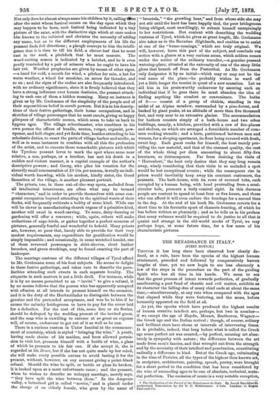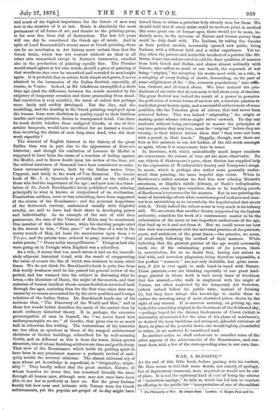THE RENAISSANCE IN ITALY.*
[FIRST NOTICE.]
THOUGH it has long since been observed how clearly de- fined, as a rule, have been the epochs of the highest human attainment, preceded and followed by comparatively barren lengths of time, yet we now begin to see less obscurely a few of the steps in the procedure on the part of the guiding Spirit who has all time in his hands. We seem to see that the great process of intent towards perfection, of gradually ameliorating a past fund of chaotic and evil matter, exhibits as its character the falling-due of many chief ends at about the same time,—simultaneously, at any rate *hen compared with the ages that elapsed while they were fostering, and the 93ORS, before humanity appeared on the field at all.
As yet, the epochs which have produced the highest results of human creative intellect are, perhaps, but two in number— if we except the age of Haydn, Mozart, Beethoven, Wagner— the Greek age and the Italian revival ; though, of course, solitary and brilliant stars have shone at intervals of intervening times. It is probable, indeed, that long before what is called the Greek age some perfect art was created,—by perfect, meaning art abso- lutely in sympathy with nature ; the difference between the art made from men's fancies, and that wrought out from the strength and by the necessity of their intellect and penetration, constituting radically a difference in kind. But at the Greek age, culminating in the time of Pericles, all the types of the highest then known art, in sculpture, architecture, painting, speech, poetry, were brought for a short period to the condition that has been considered by the wise of succeeding ages to be one of absolute, technical, mate- rial perfection. The omission of music is a very notable exception, * The Civilisation of the Period at the Renaissance in Raly. By Jacob Burckhcrdt. Authorised Translation by Sir G. 0. Middlemore. 2 vole. London: C. Sagan Paul and Co. and much of the highest importance for the future of men may rest in the creation of it at last. Music is absolutely the most permanent of all forms of art, and thanks to the printing-press, is for ever free from risk of destruction. The last 150 years will one day be considered the Greek age of music. And in spite of Lord Beaconsfield's recent sneer at Greek painting, there can be no conclusion in Art history more certain than that the Greek brain, which was not content without an ideal in all other arts unmatched except in Nature's harmonies, excelled also in the production of painting equally fine. The Premier would stand aghast at his own words, should a piece of painting of that wondrous race ever be unearthed and revealed to men's sight again. It is probable that in colour, both simple and grave, it never attained to the harmonies of the Italian Revival, especially, of course, in Venice. Indeed, as Mr. Gladstone exemplified a short time ago (and the difference between the words moulded by the exigency of temporary occasion and those proceeding from stead- fast conviction is very notable), the sense of colour was perhaps more lately and swiftly developed. But the line, and the modelling, and the shading in the Greek painting employed upon the human form were doubtless in quality equal to their faultless marble and vase pictures, drawn in unsurpassed detail. Can there be much doubt whether these maligned Greeks, at one of their artistic banquets, would have sacrificed for an instant a convic- tion involving the claims of men long since dead, who did their work superbly ?
The renewal of English interest in the history of the great Italian time was in part due to the appearance of Roscoe's histories ; and though his exaltation of Lorenzo de Medici is supposed to have been the cause of a reaction of feeling against the Medici, and to throw doubt upon his review of the time, yet the critical strictures of Sismondi have been considered as some- times unreasonably severe, both by the Italian writer, Gino Capponi, and lately in the work of Von Reumont. The recent book of Mr. J. A. Symonds is probably still on the tables of those who feel the importance of the age ; and now here is a trans- lation of Dr. Jacob Burckhardt's lately published work, relating principally to what is known or conjectured of its civilisation. Numberless outlines, more or less coinciding, have been suggested of the course of the Renaissance ; and the personal despotisms of the thirteenth century, maintained usually with frightful cruelty, are said to have had their share in developing power and individuality. As an example of the sort of rule then paramount, the case of the Visconti of Milan may be mentioned. One member of this noble house, when his starving people cried in the streets to him, "Pace, pace !" at the time of a war in the merry month of May, let loose his mercenaries upon them iz la Turque, and the priests were ordered to pray, instead of "Dons nobis pacem," "Dons nobis tranquillitatem." Things as bad also were going on in Perugia when Raphael was a schoolboy.
As a rule, it seems that too much stress is laid on the immedi- ately adjacent historical detail, with the result of exaggerating the value of events the like of which was common to many other times. We do not think Dr. Burckhardt's book is quite free from this wordy weakness until he has passed his general review of the period, and has warmed into his subject in discussing what he loves,—the literature of Dante, the might of Savonarola, and that outcome of human intellect whose causes doubtless stretched back through the ages, maturing then for the first time since man was, causes by no means accounted for by the civic qualities and foreign relations of the Italian States. Dr. Burckhardt heads one of his sections thus, "The Discovery of the World and Man," and in these few words better describes the merit of the matter than by much ordinary historical theory. It is, perhaps, the excessive preoccupation of man in himself, the "we never know how anthropomorphic we are" of Goethe, that gives rise to so much talk in otherwise fine writing. The restorations of the historian are too often as spurious as those of the scraped architectural skeletons of Gothic buildings, subscribed for by well-meaning Goths, and as different as this is from the warm, lichen-grown structure, two of whose finishing artificers are time and gentle decay. That view of the Renaissance which holds its guiding spirit to have been in any prominent manner a pedantic revival of anti- quity merits the severest criticism. The almost universal cry of men whose art knowledge is superficial, is "Originality, origin- ality 1" They hardly reflect that the great mother, Nature, of whose beauties we never tire, has remained literally the same through all human ages, although men may not once have been able to see her as perfectly as later on. But the great Italians keenly felt how near and intimate with Nature were the Greek achievements, yet the popular art-gospel of to-day might have forced them to refuse a priceless help already won for them. We I should hold that if every artist could to-morrow paint in method like some great one of former ages, there would yet be more, in'- finitely more, in the universe of Nature and human poetry than could be duly dealt with. The Italians, by taking the Greek's as their perfect models, necessarily opened new paths, being Italians, with a different faith and a wider experience. Yet to- day, when the patient and invincible intellect of a painter like Mr. Bume Jones has endeavoured to cull the finer qualities of manner from both Greek and Italian, and shares almost solitarily with Nature, who suffers so much at our hands, the reproach of ad being "original," the reception his works meet with, as a rule, is a mingling of every feeling of doubt, descending, on the part of some enlighteners of the "dim, common populations," into reek- less, virulent, and ill-timed abuse. We have noticed the pro- ductions of one critic that do not seem to fall short even of slander. The great Revival was indeed the result of a power to perceive the perfection of certain forms of ancient art, a resolute passion to reach that great beauty again, and a successful achievement of some qualities, like the Venetian glow of colour, that had never been achieved before. This was indeed "originality," the origin or starting-point whence others might strive onward. To-day our students, without being encouraged to master the principles of any true painter they may love, must be "original" before they are twenty, or their betters inform them that "they were not born with a pencil in their hands." Happily, though, now there are four or five painters in our Art bodies, of the old stock amongst us again, whom it is unnecessary here to name.
in literature, with which undoubtedly much larger numbers are conversant, the canons of true art are more observable. No one objects if Shakespeare's pure, clear diction has supplied help to the expression of Wordsworth's beauty and Tennyson's songs. In music, which is perhaps also rather more generally under- stood than painting, the same hopeful sign exists. When in Beethoven's earlier sonatas we find him now echoing Mozart's sweetness, or Haydn's subtle delicacy, or Bach's reduplicative elaboration, even the tyro considers them to be touching proofs of Beethoven's reverence for his masters. But in our painting the want of knowledge about what constitutes good technics and man- ner is so astonishing as to overwhelm the hopeful mind that meets with it. Truly indeed the colour-sense is very much in its infanoy still. We are aware that another theory, supported by the highest authority, considers the work of a consummate master to be the culmination of the more or less imperfect endeavours of the age, that lead up to it and not from it. But we could never see how this view was consistent with the universal practice of the painters, poets, and architects of the great times,—the practice, we mean, of studiously following the method of their masters. While believing that the greatest painter of the age would necessarily mark one of the culminating points of its powers, there is, nevertheless, for us no doubt that, having real artists to deal with, and nerveless plagiarism being therefore impossible, a few perfect " manners " are not only desirable, but quite neces- sary, if Art is ever again to walk hand-in-hand with Nature. Those painters,—we are thinking especially of one great land- scape painter in whose work is knit every trace of loveliness that lies around,—who walk in singleness with the might of Nature, are often neglected by the temporary Art Societies, (which indeed follow the public taste, instead of forming it), but they have always this knowledge to enable them to endure the wresting-away of most cherished prizes, theirs by the right of any canons. If to-morrow morning, on getting up, one looked for something original in the treatment of the fields and sky, —perhaps hoped for the dreamy linelessness of Corot (whichis necessarily accentuated for the aims of his phase of sentiment), or desired the keen backbone and stringent, splendid curvature of Brett, in place of the peaceful dawn, one would rightly (wonderful to relate, in art matters) be considered mad.
In another notice we shall endeavour to consider some of the other aspects of the achievements of the Renaissance, and con- trast them with a few of the corresponding aims in our own time.



































 Previous page
Previous page